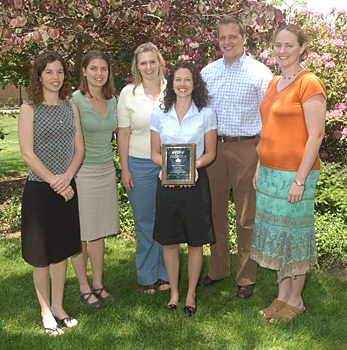
The fellows, who come from all parts of the country, already have a horticultural background, and the goal of the program is to prepare them for managerial positions. “Interests can range from plant science to education to management,” Lyons said.
Highly respected and top-notch, UD's Longwood program is one of the few that requires a thesis, Lyons said. On May 25, five graduating fellows--Abby Hird, Sonya Lepper Westervelt, Catherine Prestowitz, Casey Sharber and Aaron Steil--presented their research at Longwood Gardens auditorium.
Hird discussed “International Cooperation among Public Gardens in the Russian Federation and the United States,” pointing out it has been one of the most successful international cooperation efforts among botanists that has ever occurred--in spite of 70 years when open exchange was prevented but informal exchanges continued. In 1972, the U.S./U.S.S.R. Agreement on the Protection of the Environment was established, permitting formal and informal exchanges. Hird visited Russian botanical gardens for her research.
Westervelt was interested in fundraising and development, which is essential today to public horticulture institutions, as public and corporate funding decreases. Her research involved major donors, through interviews with them and with directors of public gardens.
She developed seven donor-motivation themes--personal connections, interest and aesthetics, public persona of an institution, involvement, people, solicitation and recognition of a gift and financial issues.
Prestowitz examined treatments for viruses infecting cannas, colorful flowering plants with attractive foliage, which are frequently used in landscape and public garden displays. New varieties of cannas, which exhibited symptoms of two viruses, had been introduced to Longwood, and she discussed the various treatments used to try to eliminate the viruses and encourage plant development.
Steil developed a six-step evaluation approach for educational programs at public gardens, which are important not only in themselves but in securing grants. The process included defining and evaluating the program, data collection methods, results and recommendations. Steil interviewed persons at 10 public gardens in the U.S. with high-quality programs and applied the criteria. The feedback from those interviewed was that the process was comprehensive and potentially useful.
Sharber talked on her research linking public gardens and the National Future Farmers of America (FFA) organization, pointing out that collaborations could benefit both. Public gardens are in urban areas and FFA is trying to diversify its mostly rural membership. The study focused on an existing internship program between Longwood Gardens and a Philadelphia high school. FFA can build on the resources of public gardens, and public gardens can build on an established audience, according to Sharber, winner of the 2006 Louise Roselle Fellowship in Public Horticulture.
Established by the trustees of the Unidel Foundation in 2001, the fellowship honors Roselle, the wife of UD President David P. Roselle, and her active interest in landscape design and renovation on campus, as well as her personal interest in gardening and horticulture.
The fellowship is given each year to a rising second-year Longwood fellow with high academic standing, excellent research program and demonstrated team-building/leadership potential, according to Lyons. Rising second-year Longwood fellow Amy M. Hoffmann, of Syracuse, N.Y., was awarded the 2007 Louise Roselle Fellowship in Public Horticulture.
Longwood fellows generally are in the program for two years, and “hit the ground running,” Lyons said. “They are involved in Longwood activities immediately as volunteers and serving on committees, in addition to their classes. This year, besides taking courses in urban affairs and leadership, the students have been taking a course on human resources at the Lerner College of Business and Economics. It's a good balance, learning about nonprofit and for-profit organizations,” Lyons said.
Another component of the Longwood program is touring public gardens. During Winter Session, the fellows tour tropical gardens in developing countries in South America and, in the summer, they visit gardens in North America. The fellows have behind-the scenes visits and learn different approaches to running public gardens, and the tours also spread the word about UD's program, Lyons said.
Lyons has a bachelor's degree from Rutgers University and his master's and doctoral degree from the University of Minnesota in horticultural science. He came to UD after 17 years at Virginia Polytechnic Institute and State University.
Article by Sue Moncure
Photo by Duane Perry


